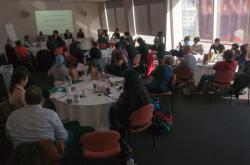This is CCR's weekly "Frontlines of Justice" news round-up, keeping you in the loop about what we've been up to and what's coming soon. Check it out every Monday, your one-stop-shop for CCR opinions, news coverage, reports from court appearances, upcoming events, and more!
CBP is systematically and unlawfully turning away refugees all along the southern border
[caption caption="Photo Credit: Patrick Warner" align="right"] [/caption]
[/caption]Everyone fleeing violence and persecution has the right to apply for asylum. Last Tuesday, with the American Immigration Council and our clients at Al Otro Lado, we filed a motion for class certification in our lawsuit challenging the government's practice of depriving vulnerable asylum seekers of access to the U.S. asylum process in clear violation of U.S. and international law. We showed through hundreds of cases that U.S. Customs and Border Protection's (CBP) practice of blocking access to asylum is so systematic that the individual asylum seekers in this suit, six of whom are named plaintiffs, should be permitted to represent all asylum seekers who have been or will be subject to this practice.
In turning people away, CBP employs a variety of tactics including misinformation, threats and intimidation, threats of forced family separation, verbal and physical abuse, and coercion. Many asylum seekers were unlawfully turned away multiple times, despite having expressed their fear of returning to their home countries in the face of a bona fide humanitarian crisis in Mexico, Haiti, and certain countries in Central America. The United Nations has documented the extreme violence that women in particular – and especially transgender women – and children face when fleeing their home countries, experiencing or facing the threat of rape, assault, and extortion. Fueling violence and instability in Central America for decades, U.S. foreign policy is the root cause of this refugee crisis, and is now being exacerbated by the Trump administration's escalation of draconian immigration policies. CBP's unlawful conduct can constitute a death sentence for asylum seekers, many of whom are being actively pursued during their dangerous journeys to the border.
As CCR's Legal Director Baher Azmy said, "CBP's unconscionable practice signals contempt for the safety and dignity of extremely vulnerable individuals who seek safety and shelter in the United States. The individuals who have filed declarations in support of this lawsuit have demonstrated enormous courage in seeking a better life for their families and in supporting the rights and hopes of others who will need refuge from danger in the future."
With our supporters at our side, we will fight this injustice and do everything we can to ensure the safety of the people who so bravely shared their stories with us.
CCR signed on to a coalition letter opposing Trump's Extreme Vetting Initiative
Fifty-six civil rights, civil liberties, government accountability, human rights, immigrant rights, and privacy organizations wrote to the acting Homeland Security Secretary to oppose ICE's proposed new Extreme Vetting Initiative. The initiative would use social media monitoring, machine learning, and automated decision-making to assist in vetting visa applicants and to generate leads for deportation. According to the letter, "As it is described in ICE documents, this program would be ineffective and discriminatory. It would also pose a signal threat to freedom of speech and assembly, civil liberties, and civil and human rights." Together with our allies, we urged the Department of Homeland Security to abandon this potentially disastrous effort.
South African activists join us in New York
[caption align="left"] [/caption]
[/caption]Last week, CCR co-hosted an amazing convening of lawyers, activists, and academics from the United States and South Africa. In light of this dangerous political moment in the United States, the purpose was to bring people from the two countries together to consider the use of law to protect and enhance the political spaces necessary for basic civil rights and to defend hard-won socio-economic rights gains made in the recent past.

